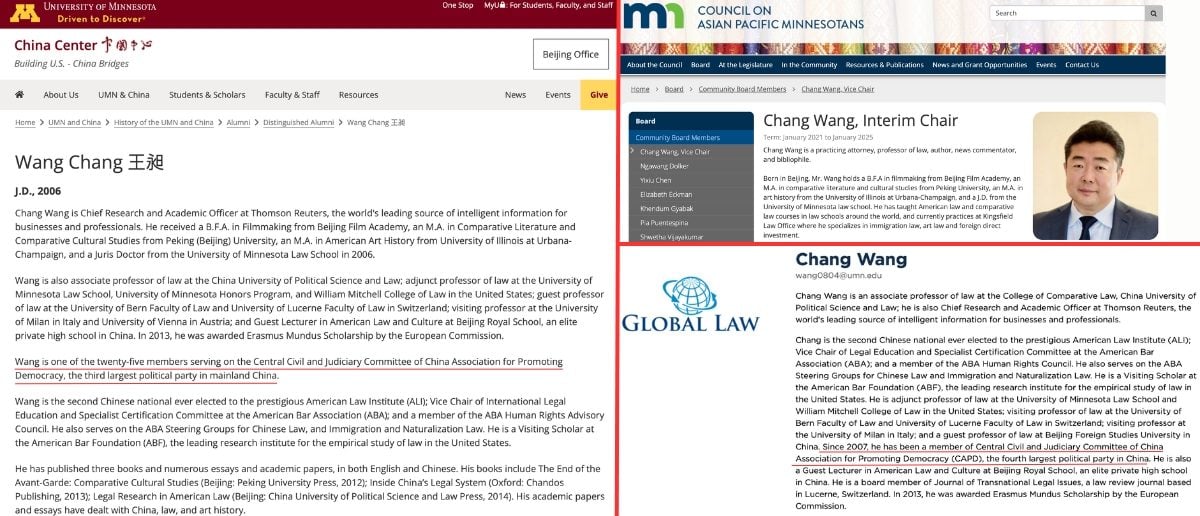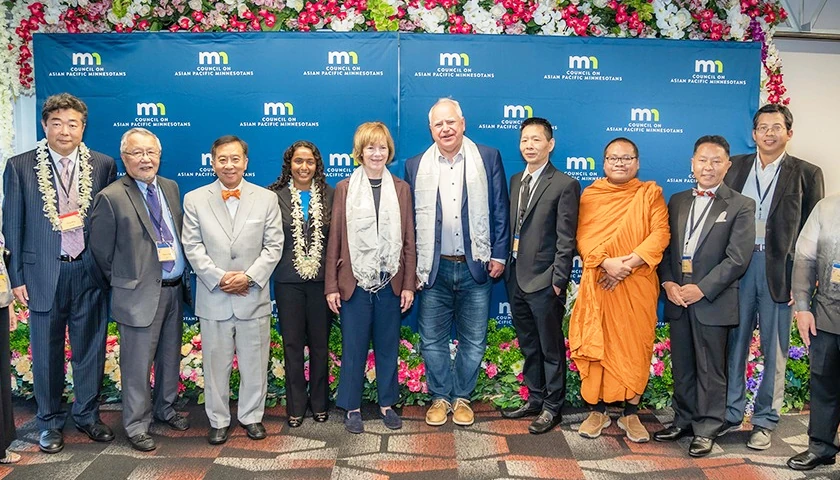by Philip Lenczycki
Minnesota Gov. Tim Walz, the Democratic vice presidential nominee, appointed a member of a political faction that has pledged loyalty to the Chinese Communist Party (CCP) to a state board that advises the government on Asian-American affairs, a Daily Caller News Foundation investigation found.
Walz first appointed Chang Wang, a Minnesota-based attorney, to the Council On Asian Pacific Minnesotans in May 2020. Wang now serves as the “interim chair” of the Council On Asian Pacific Minnesotans, which advises the governor, legislature and other state agencies by promoting the “economic, social, legal and political equality of Asian Pacific Minnesotans,” according to its website. Wang’s term is up in January 2025.
The council spent more than half a million dollars of taxpayer funding in 2023, according to its annual report.
 But for over a decade, Wang has also been affiliated with the China Association For Promoting Democracy (CAPD), the DCNF found through a review of Chinese government announcements, archived University of Minnesota records and Chinese-language publications written by Wang himself.
But for over a decade, Wang has also been affiliated with the China Association For Promoting Democracy (CAPD), the DCNF found through a review of Chinese government announcements, archived University of Minnesota records and Chinese-language publications written by Wang himself.
CAPD is one of the handful of alternative Chinese political parties allowed to operate in the communist nation. Like China’s other minor parties, CAPD is “loyal” to the CCP and continues “to function within the structure of the Chinese People’s Political Consultative Conference (CPPCC),” which is the country’s top political advisory body, according to the Federal Research Division of the Library of Congress.
CAPD is allowed to operate in China based upon their organization’s stated promise to “rally closely around” the CCP’s Central Committee and play a role as advisors and assistants to the CCP, according to Xinhua, China’s official news agency.
Since joining the Minnesota state council, records show that Wang has been recognized by the Chinese government on multiple occasions, including granting him a title and even accepting a policy research proposal he submitted.
“My elderly parents are my only ties to China,” Wang told the DCNF by email, when asked about his relationship with CAPD. Wang’s profile on the University of Minnesota’s website does not currently mention his CAPD affiliation, though an archived version does.
Wang previously told the outlet China Insight his parents were “senior scientists” at “Academia Sinica,” which is the historic name for the Chinese Academy of Sciences (CAS). CAS reports directly to China’s State Council, with “much of its work contributing to products for military use,” according to the U.S. Department of Defense.
CAS is a “privileged institution” that’s “tightly monitored” by the CCP, said Steve Yates, China Policy Initiative chair at the America First Policy Institute and former Chinese language analyst for the National Security Agency.
“For someone to have two parents in that entity, it basically is the equivalent of being not just a made man, but a made family,” Yates told the DCNF.
Wang has also previously said he works as a senior associate professor of law at the Beijing-based China University of Political Science and Law, whose website still lists him as faculty.
Neither Walz’s office nor the Harris-Walz campaign responded to multiple requests for comment.
Walz’s close relationship with China and its political mechanisms have come under intense scrutiny from Republican lawmakers, like Kentucky Rep. James Comer, who recently sent a letter to FBI Director Christopher Wray requesting information pertaining to “any Chinese entity or individual with whom Mr. Walz may have engaged or partnered.”
Walz has traveled to China approximately 30 times and even worked for Macau Polytechnic University while serving in Congress, Comer’s letter says. Media reports have also dug up past comments from Walz where he appears to lavish praise on Chinese communism — for instance, Walz reportedly told high school students in 1991 that communism “means that everyone is the same and everyone shares.”
More recently, the DCNF reported that Walz has attended numerous events organized by members of a Minnesota nonprofit affiliated with a CCP influence and intelligence agency. Among other examples, members of the nonprofit and related organizations held a fundraiser for Walz’s gubernatorial reelection in 2022, the DCNF found.
"@GovTimWalz could explain away 1 or 2 facts, but he can't explain away the pattern & the @DailyCaller just dropped an investigation a day or so ago, which showed Walz maintaining regular contact w/ Communist Party front organizations in MN.
So, we go back to the 1990s we have… pic.twitter.com/SSeuTVA9in
— Philip Lenczycki 蔡岳 (@LenczyckiPhilip) August 29, 2024
“You would think that there would be some screening,” Yates said of Walz’s appointment of Wang.
“Of what possible value-add is someone with ties to that entity in China to the citizens of the United States or to Minnesota, and why would a governor with a generation of experience coming and going to the People’s Republic of China want someone from that world having privileged access to advise leaders in Minnesota on any issue?” Yates told the DCNF.
‘Not Really About Democracy’
While the word “democracy” appears in its name, CAPD describes itself as “a political party that accepts the leadership of the CCP and cooperates with the CCP as a participant in socialism with Chinese characteristics.” CAPD also says its members are mainly intellectuals working in academia, science, media and related fields.
“When you are engaging entities from communist countries that have the word ‘democracy’ in them, you have a near 100% chance that they’re not really about democracy,” Yates told the DCNF. “You’re talking about organizations that are meant to interact with people and groups in the Free World on behalf of the ultimate authority in the PRC: the CCP.”
John Dotson, deputy director of the Global Taiwan Institute, told the DCNF that CAPD is “one of what the CCP calls the ‘eight democratic parties’ that operate alongside the ruling CCP, in the effort to provide a veneer of pluralism to the [Chinese] system.”
“Anyone who is a member of one of the ‘eight democratic parties’ should be understood as a CCP member, subject to Party directives, etcetera,” said Dotson, a former U.S. Navy intelligence officer.
The DCNF determined Wang’s CAPD membership through a review of multiple archived English and Chinese-language profiles.
For instance, an archived version of Wang’s 2022 bio on the University of Minnesota’s China Center website identified him as “one of the twenty-five members serving on the Central Civil and Judiciary Committee of China Association For Promoting Democracy, the third largest political party in mainland China.”
At some point between January and July 2023, Wang’s membership in the Chinese political party was removed from his China Center bio.
The China Center did not respond to the DCNF’s requests for comment.
CAPD’s Chinese-language website still names Wang as a member of its Central Civil and Judiciary Committee, and also identifies Wang as a professor of the Institute of Comparative Law at China University of Political Science and Law.
Wang is currently listed as faculty on the website of China University of Political Science and Law and his position at the school is noted in several online bios, including his Barnes & Noble author bio, as well as in a 2019 interview on his law firm’s website.
Wang also taught at São Paulo Law School in Brazil, where his online bio says “[s]ince 2007, he has been a member of Central Civil and Judiciary Committee of China Association for Promoting Democracy (CAPD), the fourth largest political party in China.” Wang’s affiliation with the Brazilian law school are noted in social media posts from China University of Political Science and Law.
Indeed, Wang’s current bio on the University of Minnesota’s website states he “holds adjunct and visiting professorships at law schools and business schools in the U.S., China, Austria, Australia, Italy, Switzerland, and Brazil.” The bio, however, does not specify any particular schools with which he is associated.

‘National Advanced Information Worker’
The Chinese government has recognized Wang’s contributions on at least two occasions, the DCNF found.
CAPD awarded Wang the title “National Advanced Information Worker For Reflecting Societal Sentiments And The People’s Opinion” in November 2021 — more than a year after Walz first appointed Wang to the state Asian American affairs council in May 2020.
The list of award recipients appears to have been drafted in December 2020, but officially announced in 2021, according to a review of CAPD’s website.
CAPD created the award in order to commend “outstanding achievements and contributions” related to a 2021 CCP Central Committee memo directing China’s eight “democratic parties” to expand their implementation of “Xi Jinping Thought On Socialism With Chinese Characteristics For A New Era.”
The U.S. Department of Defense describes “Xi Jinping Thought” as the Chinese dictator’s “namesake ideology.”
In July 2021, the Chinese government’s Supreme People’s Procuratorate announced the selection of Wang’s legal research proposal on international cybercrime as a research project to underwrite. The announcement lists Wang by his CAPD membership and his faculty position at China University Of Political Science And Law.
The Supreme People’s Procuratorate offers selected research projects an approximately $7,000 Chinese government subsidy, the department’s website states.
The Procuratorate is responsible for legal supervision and prosecution in China, according to the Chinese government.
“What this entity in China does has some functions that touch upon the prosecution of people inside the Chinese system, and oversight of what would be rule-of-law type issues generally,” Yates told the DCNF.
Wang did not respond to the DCNF’s questions about the Procuratorate accepting his research proposal or the apparent award that went along with it.
‘Adjuncts Of The CCP’
In addition to cooperating with the CCP, CAPD also has several other Chinese government affiliations, such as serving as a “member of the patriotic United Front,” according to its website.
The United Front is a “unique blend of engagement, influence activities, and intelligence operations” that the CCP uses to “shape its political environment, including to influence other countries’ policy toward [China] and to gain access to advanced foreign technology,” according to the House Select Committee on the CCP.
CAPD members also serve as delegates to another Chinese government United Front agency called the Chinese People’s Political Consultative Conference (CPPCC), according to the CPPCC’s website. The CPPCC’s English-language charter states its delegates must “uphold the leadership” of the CCP “and the socialist cause,” “take advantage of the CPPCC as a United Front organization,” and “keep state secrets.”
“In reality, these eight nominal political parties are simply adjuncts of the CCP, and serve as window dressing in fora such as the CPPCC,” Dotson said.
China expert and author Gordon Chang told the DCNF that Walz’s travels through China and his history associating with CCP-tied individuals raises the question of why the governor appointed a member of a CCP-approved political party to serve in Minnesota’s executive branch.
“Walz appointing a Chinese Communist stooge doesn’t automatically make him a Chinese Communist supporter,” Chang said, “but who other than a Chinese Communist supporter would do that?”
– – –
Philip Lenczycki is a reporter at Daily Caller News Foundation.
Photo “Tim Walz” by Council on Asian Pacific Minnesotans.





